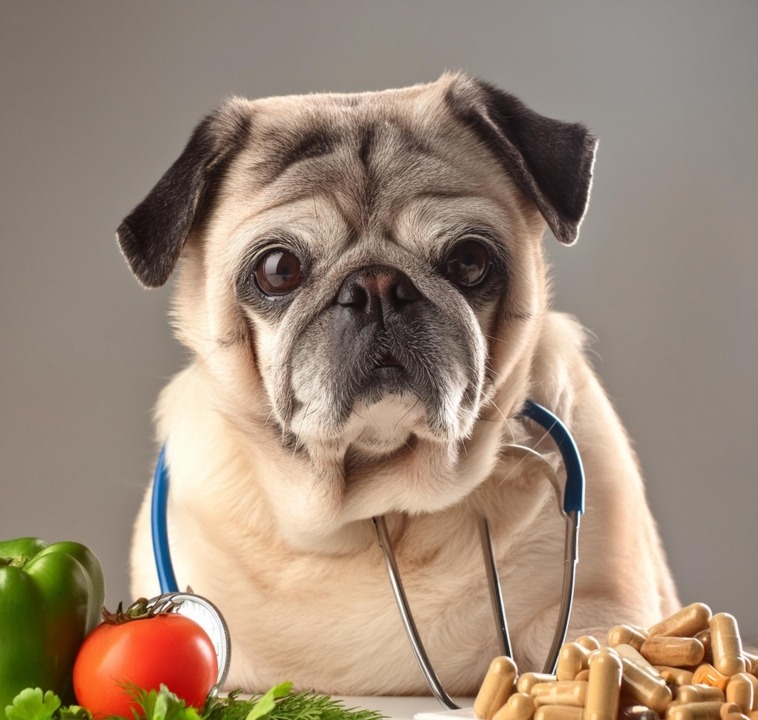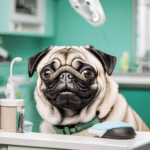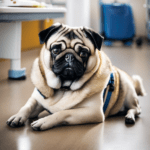Last updated on September 27th, 2024
Here’s an overview:
Introduction: Understanding the Needs of Aging Pugs
Optimal Nutrition for Senior Dogs Balancing Diet for Health
Exercise Plans: Keeping Your Senior Pug Active Safely
Regular Vet Check-Ups: Prevention and Early Detection
Dental Health: A Key Component in Senior Pug Care
Joint Health and Mobility: Managing Arthritis and Other Ailments
Mental Health: Cognitive Function and Enrichment Activities
Comfortable Living Spaces: Adjusting Your Home for a Senior Pug
Common Health Issues in Senior Pugs and How to Address Them
The Involvement of Additional Food and Dietary Supplements in the Older Pugs
End of Life Care: Preparing for the Golden Years
Conclusion: Celebrating and Supporting Your Pug’s Golden Years
Introduction: Understanding the Needs of Aging Pugs
As they advance into their golden years, senior pug health care significantly changes. It is important therefore that you take care of an aged canine by ensuring its health change monitoring, dietary needs, comfort among other things. These condition can include age-related ailments such as arthritis, dental problems or vision issues. Recognizing these requirements are major concerns concerning their welfare. With more frequent visits to the veterinarian’s office, a different diet to support these pets’ health as well as new exercise routines; there are numerous alterations that must be made to make sure that your home will remain safe enough when it comes to your aging dogs. By being proactive, owners can help ensure that their senior pugs enjoy their last years with dignity and happiness.
Optimal Nutrition for Senior Dogs Balancing Diet for Health
Older pugs need a carefully balanced diet as they grow old if they want to stay healthy. Their diet should contain large amounts of high quality proteins that will facilitate muscle growth with low levels of fats to control their body mass. Joint health and cognitive ability would require the presence of key nutrients like omega-3 fatty acids.
- Monitor fat intake; choose healthy oils such as fish oil
- This is because they can digest them easily
- Do not feed too much food at once
- Provide antioxidants against age-related diseases
- Hydration should be maintained by allowing pets to drink fresh water at all times.
Obesity in pugs may lead to limited mobility which can affect their ability to exercise or perform daily chores. Weight reduction in physical activity is another factor responsible for weight gain, hence leading to a vicious cycle.
In order to maintain weight control in aging pugs, one has to ensure proper nutritional intake based on the age and activity level. These dogs need less energy than the younger ones and therefore benefit from diets specifically designed for this life stage.
Regular veterinary check-ups will enable you watch out your pug’s weight so that it doesn’t increase more. These visits can often be used as an opportunity for early detection of any underlying issues related to weight which include guidance regarding dietary adjustment or effective weight control methods.
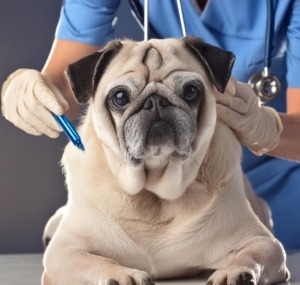
Finally, providing age-appropriate exercise helps to maintain muscle tone and supports overall health. On the other hand, it can be a calm walk in the park or a short time play with them.
Exercise Plans: Keeping Your Senior Pug Active Safely
Senior pugs require gentle exercise to maintain their health without straining their aging bodies. Walking is an excellent low-impact activity that helps manage weight and maintain joint mobility. Walking should be kept easy and short avoiding hottest hours of the day so as to avoid overheating. Another good example is swimming for older pugs since it is hard on their joints but at least provides some exercise. Pugs being brachycephalic (short-nosed) breeds, this will go a long way in ensuring they do not overwork themselves.
Indoor play using soft toys offers them mental stimulation and mobility without exposure to outdoor elements. Throughout each day incorporate few short sessions according to your pug’s energy level and physical limitations. At all times be vigilant for signs of fatigue or difficulty breathing and provide plenty of water and rest periods. Regular vet check-ups will enable you modify senior dog’s exercise regimen depending on its specific health care needs.
Regular Vet Check-Ups: Prevention and Early Detection
For senior pugs, regular veterinary check-ups are crucial for maintaining health and quality of life. These visits allow for:
- Preventive Care: Yearly or biannual wellness exams are essential. The vet can administer necessary vaccinations, monitor weight, and check for any signs of age-related conditions.
- Early Detection: Regular check-ups increase the chances of catching diseases such as arthritis, heart problems, or diabetes early on which can significantly bolster management options.
- Dental Health: As a pug gets older dental care becomes vital. Vets can diagnose periodontal disease which affects the general wellbeing before it worsens.
- Diet and Nutrition Advice: A professional opinion regarding dietary adjustments could help address the changing nutritional needs of senior pugs.
Prioritize veterinarian visits to help ensure your pug’s golden years are as comfortable and healthy as possible.
Dental Health: A Key Component in Senior Pug Care
As pugs age, they become increasingly susceptible to dental problems, often due to a combination of genetic predisposition and acquired conditions. Failure to address dental health issues may lead to tooth loss, infections or other health problems which reduce the quality of life for a senior pug. Regular dental check-ups conducted at least biannually can enable early intervention in case there is periodontal disease.
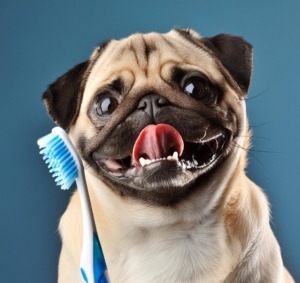
Daily brushing using vet-approved toothpaste helps control plaque and tartar formation. Dental chews and toys act as an adjunct to home care by stimulating gums and providing mechanical cleaning of teeth. Furthermore, this will be strengthened through a nutritionally balanced diet that supports good oral health for older dogs. All dentists must be vigilant on signs such as halitosis, dysphagia or pawing at mouth anything out of normal should prompt quick medical attention.
Joint Health and Mobility: Managing Arthritis and Other Ailments
Some of the effective strategies include:
- Keep a healthy weight to reduce strain on joints.
- Supplementing their diet with glucosamine and chondroitin for healthy joints
- Performing exercises gently everyday to keep the joints active
- Using orthopedic bedding for a comfortable sleep
- Giving them non-steroidal anti-inflammatory medications as advised by a veterinarian or an appropriate expert in these matters.
- Trying physical therapies like massage or hydrotherapy
It’s important that my pug has regular vet check-ups so that I can monitor his health status regarding his bones, muscles, ligaments, etc., adjust accordingly to make sure he stays mobile and comfortable throughout this stage of his life.
Mental Health: Cognitive Function and Enrichment Activities
As pugs grow older, their mental well-being becomes as important as physical aspects. It is therefore important to support cognitive function which tends to decline amongst them with time through engaging them mentally.
- Introduce toys that require problem solving skills from your senior pug.
- Create scavenger hunts where they sniff around things such as food or other objects while keeping their minds actively working.
- For instance, one can teach senior dogs simple new tricks that stimulate their cognitive plasticity,
- To ensure emotional well-being and mental state consider socializing the aging dog with other pets or humans.
- A sense of stability goes a long way in mitigating anxiety hence maintaining consistent routines can be useful in achieving this aim.
Routinely doing these activities will enhance your pet’s quality of life during old age while it might even slow down dementia progression among other cognitive functions related impairments
Comfortable Living Spaces: Adjusting Your Home for a Senior Pug
When dogs reach their twilight years they become less mobile thus requiring more comfortable living spaces. Here are some adjustments you could make to your home to make it more senior-friendly:
- Replace stairs with ramps as this is less demanding on joints
- To help the old dogs have a better sleep, one can provide them with orthopedic beds.
- Use non-slip mats on surfaces that are prone to wetness such as tiled floors or wood.
- Make sure their food and water is easily within their reach without having to stretch too much or strain anything unnecessarily.
- Ensure the place is clutter free so you avoid hazards or accidents caused by obstruction(s).
These changes will improve your aged pug’s life significantly making it comfortable and safe throughout its last years.
Common Health Issues in Senior Pugs and How to Address Them
There are typically several health challenges that majority of older pugs face. Consider these common concerns:
- Dental Problems: Brushing daily helps maintain oral hygiene. Regular veterinary cleaning can prevent gum diseases
- Breathing Difficulties: Being brachycephalic, pugs often experience respiratory difficulties. Therefore, keep them in a cool ambient condition avoiding vigorous exercises.
- Joint Issues: Arthritis often affects old animals. Orthopedic beds and supplements or medications like those given by veterinarians would be helpful here.
- Eye Conditions: Early detection of corneal ulcers through periodic checks can help protect eyesight. In some cases, protective eyewear might be needed while surgery could also be an option where necessary.
- Skin Infections: Keep skin folds clean and dry so that infections do not set in; consult a vet regarding proper skin care products if need be although she does mention anything about her dog suffering from any skin problems including dermatitis, rashes etc.
The Involvement of Additional Food and Dietary Supplements in the Older Pugs
Upon aging, there is a need to examine their diet to ensure that they keep their healthy lifestyle. These are cases where older pugs may be aided by supplements like glucosamine which aid in making sure the joints remain healthy thus curbing arthritis. Cognitive functioning can be improved through fish oil supplements containing omega-3 fatty acids, while reducing inflammation.
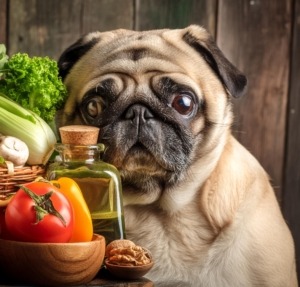
Specialized senior dog diets are formulated to support aging organs and manage weight; mature pugs have an inclination to obesity. These diets usually contain higher fiber content, fewer calories and enough high quality protein to sustain muscle mass. Always consult a veterinarian before making significant changes of diet or adding supplements as individual health conditions and needs could differ.
End of Life Care: Preparing for the Golden Years
For example, if your beloved old Pug has been with you for some years then care at the end-of-life becomes important. Take good care of your senior Pug by:
- Creating a comfortable living environment with ease to feeding area, watering point, sleeping place.
- Seeking advice from the veterinary on how to address any age-related illnesses and effective pain management strategies.
- Establishing gentle regular workouts only for mobility purposes.
- Consult vet on quality life issues so as not to get caught off guard when things go wrong
- Some palliative care options include special diets or supplements or supportive therapy into this study.
Again always provide comfort and love for every moment spent together till it’s over don’t forget that!
Conclusion: Celebrating and Supporting Your Pug’s Golden Years
This is a time when owners can look back on what they’ve done for us all these years as well as show some gratitude towards them through patience filled love. Owners should:
- Visit the nearest veterinary clinic when required.
- Ensure they have a balanced diet that is suitable for their age and level of activity.
- Keep them mentally and physically stimulated, but respect their limits.
- Make necessary home modifications to accommodate decreased mobility.
- Give them cozy and easily accessible resting places.
With the above tips, owners can make the golden years of their senior pugs more meaningful by celebrating their uniqueness in relationships.


